Retail Strategies: UK Grocery Market Analysis and Recommendations
VerifiedAdded on 2020/02/05
|12
|4076
|72
Report
AI Summary
This report examines the UK grocery market, focusing on key changes and strategic responses for a large food retailer. It begins with an introduction to the competitive landscape and then identifies significant shifts in the market, including the influence of political, economic, social, technological, environmental, and legal factors (PESTEL analysis), specifically focusing on Tesco. The report also analyzes microenvironmental factors such as competitors, customers, and consumer behavior. The second part of the report suggests strategies and tactics that the retailer could use to maintain and increase sales, considering the low-profit margins and the need to attract customers. The report concludes with a summary of the findings and recommendations for the retailer's success in the dynamic UK grocery market. The report covers consumer behavior, market trends and competition in the UK grocery market.
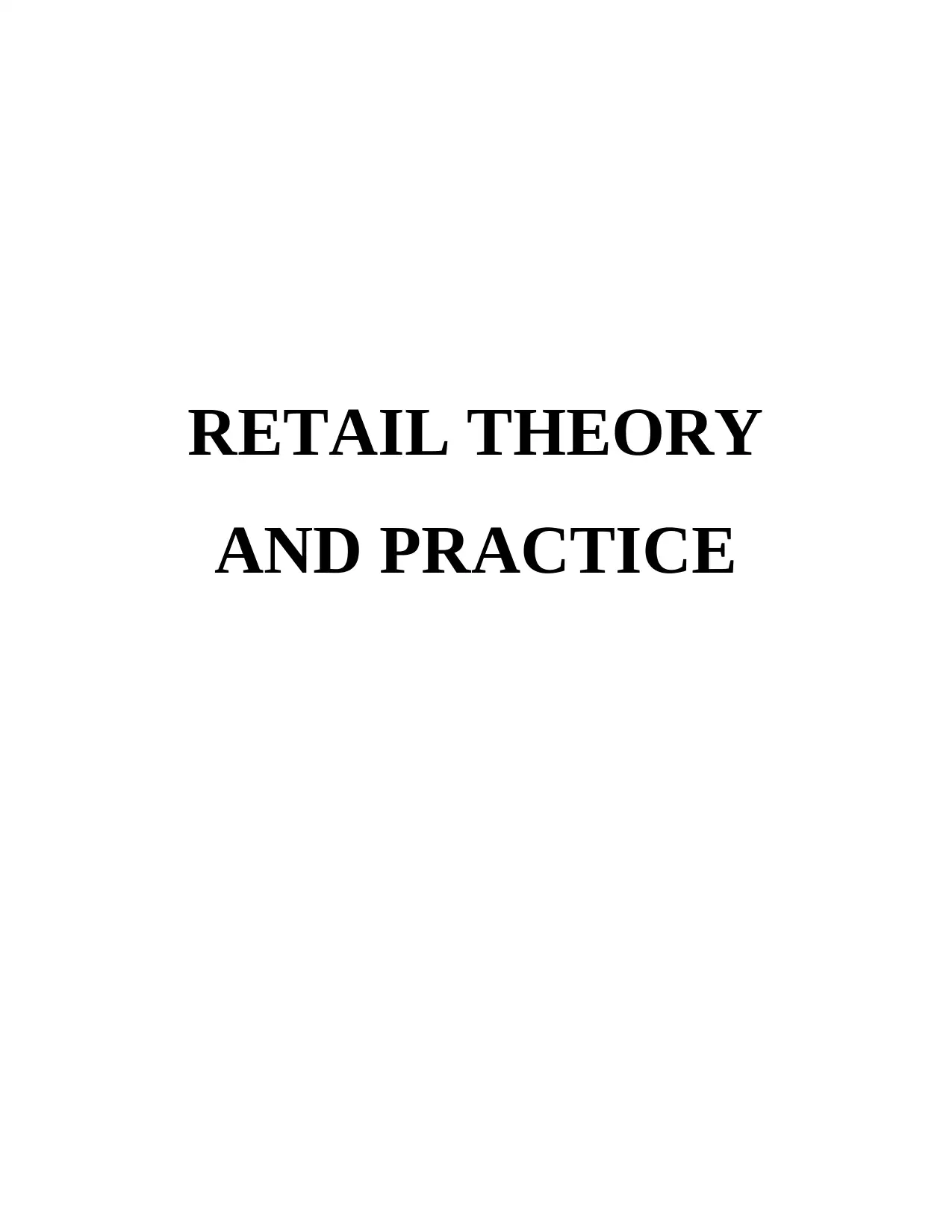
RETAIL THEORY
AND PRACTICE
AND PRACTICE
Paraphrase This Document
Need a fresh take? Get an instant paraphrase of this document with our AI Paraphraser
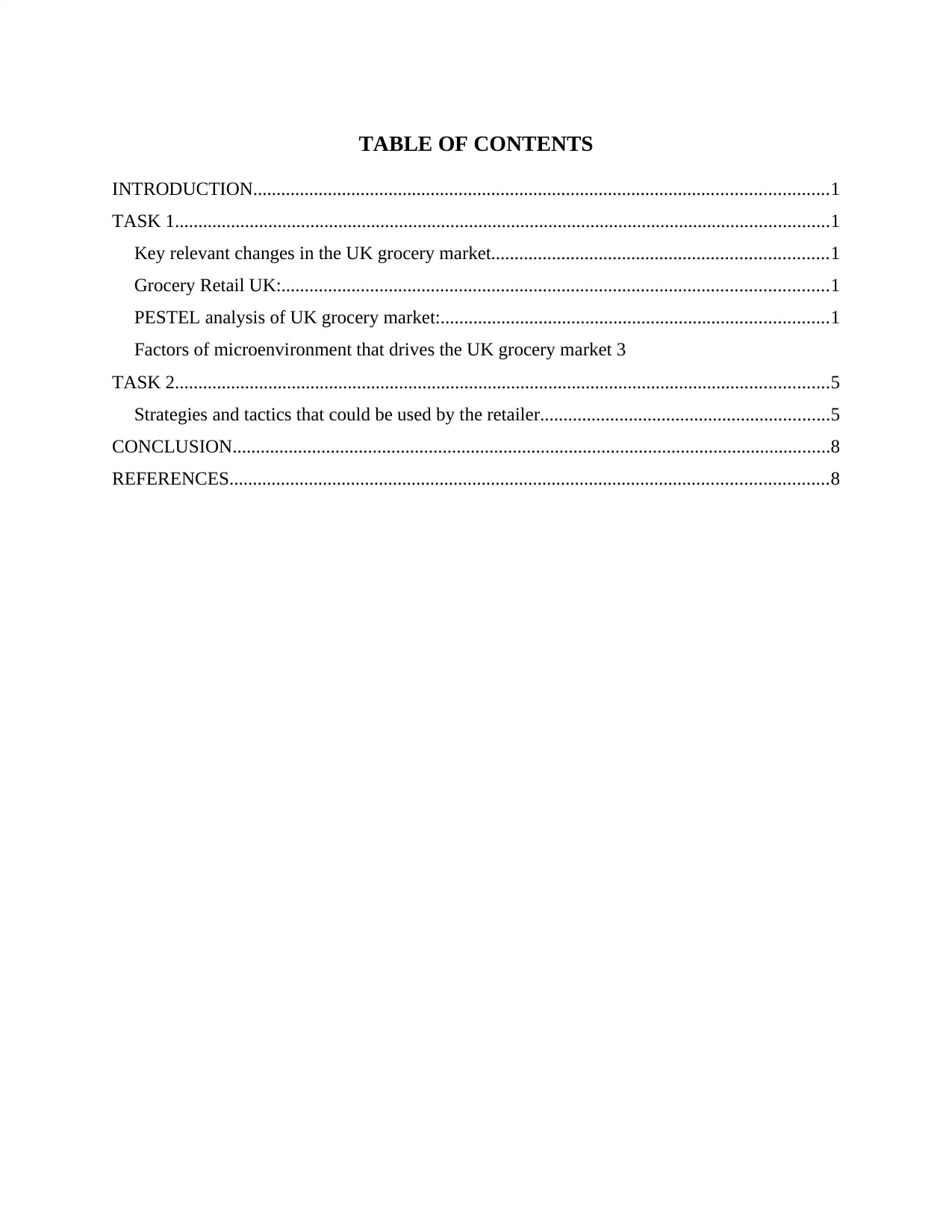
TABLE OF CONTENTS
INTRODUCTION...........................................................................................................................1
TASK 1............................................................................................................................................1
Key relevant changes in the UK grocery market........................................................................1
Grocery Retail UK:.....................................................................................................................1
PESTEL analysis of UK grocery market:...................................................................................1
Factors of microenvironment that drives the UK grocery market 3
TASK 2............................................................................................................................................5
Strategies and tactics that could be used by the retailer..............................................................5
CONCLUSION................................................................................................................................8
REFERENCES................................................................................................................................8
INTRODUCTION...........................................................................................................................1
TASK 1............................................................................................................................................1
Key relevant changes in the UK grocery market........................................................................1
Grocery Retail UK:.....................................................................................................................1
PESTEL analysis of UK grocery market:...................................................................................1
Factors of microenvironment that drives the UK grocery market 3
TASK 2............................................................................................................................................5
Strategies and tactics that could be used by the retailer..............................................................5
CONCLUSION................................................................................................................................8
REFERENCES................................................................................................................................8
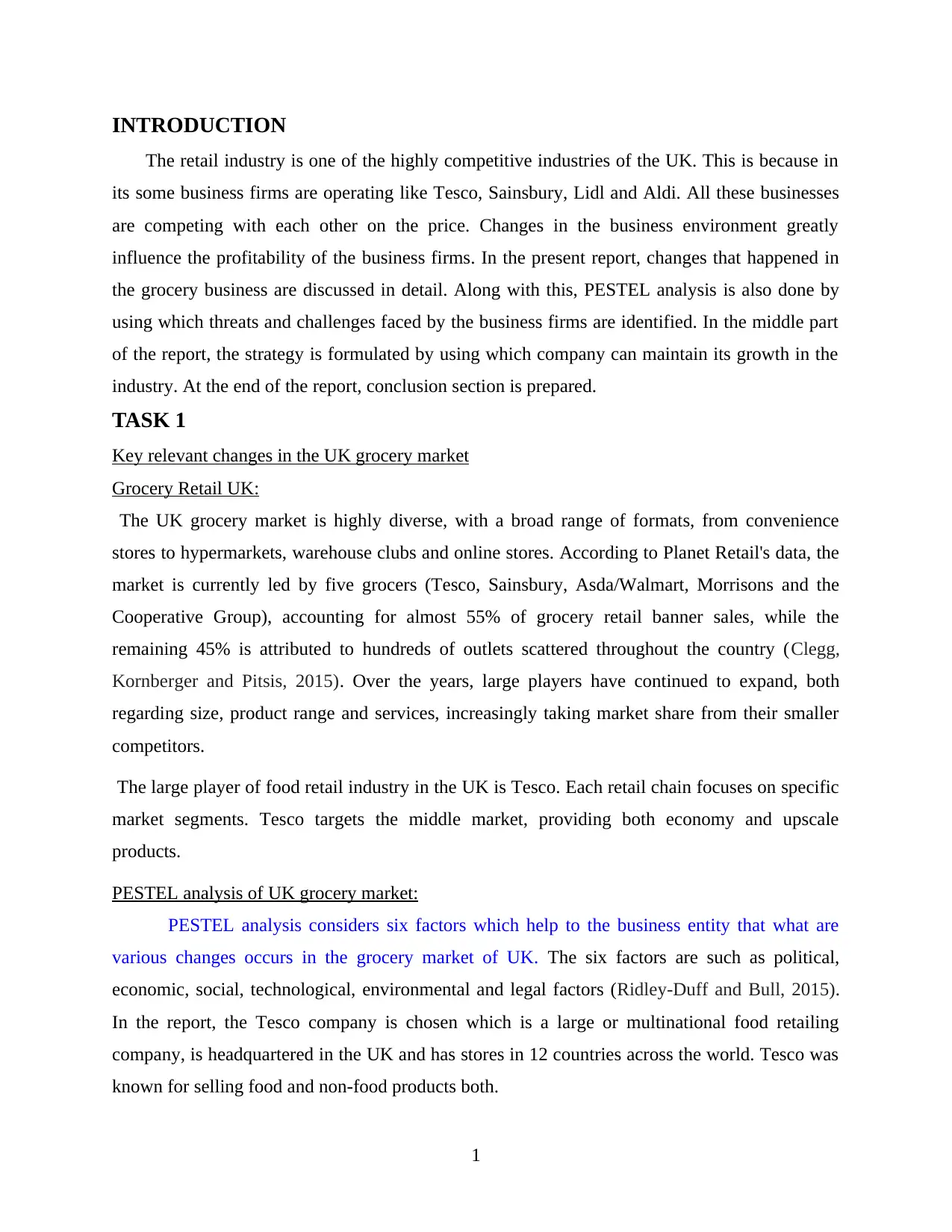
INTRODUCTION
The retail industry is one of the highly competitive industries of the UK. This is because in
its some business firms are operating like Tesco, Sainsbury, Lidl and Aldi. All these businesses
are competing with each other on the price. Changes in the business environment greatly
influence the profitability of the business firms. In the present report, changes that happened in
the grocery business are discussed in detail. Along with this, PESTEL analysis is also done by
using which threats and challenges faced by the business firms are identified. In the middle part
of the report, the strategy is formulated by using which company can maintain its growth in the
industry. At the end of the report, conclusion section is prepared.
TASK 1
Key relevant changes in the UK grocery market
Grocery Retail UK:
The UK grocery market is highly diverse, with a broad range of formats, from convenience
stores to hypermarkets, warehouse clubs and online stores. According to Planet Retail's data, the
market is currently led by five grocers (Tesco, Sainsbury, Asda/Walmart, Morrisons and the
Cooperative Group), accounting for almost 55% of grocery retail banner sales, while the
remaining 45% is attributed to hundreds of outlets scattered throughout the country (Clegg,
Kornberger and Pitsis, 2015). Over the years, large players have continued to expand, both
regarding size, product range and services, increasingly taking market share from their smaller
competitors.
The large player of food retail industry in the UK is Tesco. Each retail chain focuses on specific
market segments. Tesco targets the middle market, providing both economy and upscale
products.
PESTEL analysis of UK grocery market:
PESTEL analysis considers six factors which help to the business entity that what are
various changes occurs in the grocery market of UK. The six factors are such as political,
economic, social, technological, environmental and legal factors (Ridley-Duff and Bull, 2015).
In the report, the Tesco company is chosen which is a large or multinational food retailing
company, is headquartered in the UK and has stores in 12 countries across the world. Tesco was
known for selling food and non-food products both.
1
The retail industry is one of the highly competitive industries of the UK. This is because in
its some business firms are operating like Tesco, Sainsbury, Lidl and Aldi. All these businesses
are competing with each other on the price. Changes in the business environment greatly
influence the profitability of the business firms. In the present report, changes that happened in
the grocery business are discussed in detail. Along with this, PESTEL analysis is also done by
using which threats and challenges faced by the business firms are identified. In the middle part
of the report, the strategy is formulated by using which company can maintain its growth in the
industry. At the end of the report, conclusion section is prepared.
TASK 1
Key relevant changes in the UK grocery market
Grocery Retail UK:
The UK grocery market is highly diverse, with a broad range of formats, from convenience
stores to hypermarkets, warehouse clubs and online stores. According to Planet Retail's data, the
market is currently led by five grocers (Tesco, Sainsbury, Asda/Walmart, Morrisons and the
Cooperative Group), accounting for almost 55% of grocery retail banner sales, while the
remaining 45% is attributed to hundreds of outlets scattered throughout the country (Clegg,
Kornberger and Pitsis, 2015). Over the years, large players have continued to expand, both
regarding size, product range and services, increasingly taking market share from their smaller
competitors.
The large player of food retail industry in the UK is Tesco. Each retail chain focuses on specific
market segments. Tesco targets the middle market, providing both economy and upscale
products.
PESTEL analysis of UK grocery market:
PESTEL analysis considers six factors which help to the business entity that what are
various changes occurs in the grocery market of UK. The six factors are such as political,
economic, social, technological, environmental and legal factors (Ridley-Duff and Bull, 2015).
In the report, the Tesco company is chosen which is a large or multinational food retailing
company, is headquartered in the UK and has stores in 12 countries across the world. Tesco was
known for selling food and non-food products both.
1
⊘ This is a preview!⊘
Do you want full access?
Subscribe today to unlock all pages.

Trusted by 1+ million students worldwide
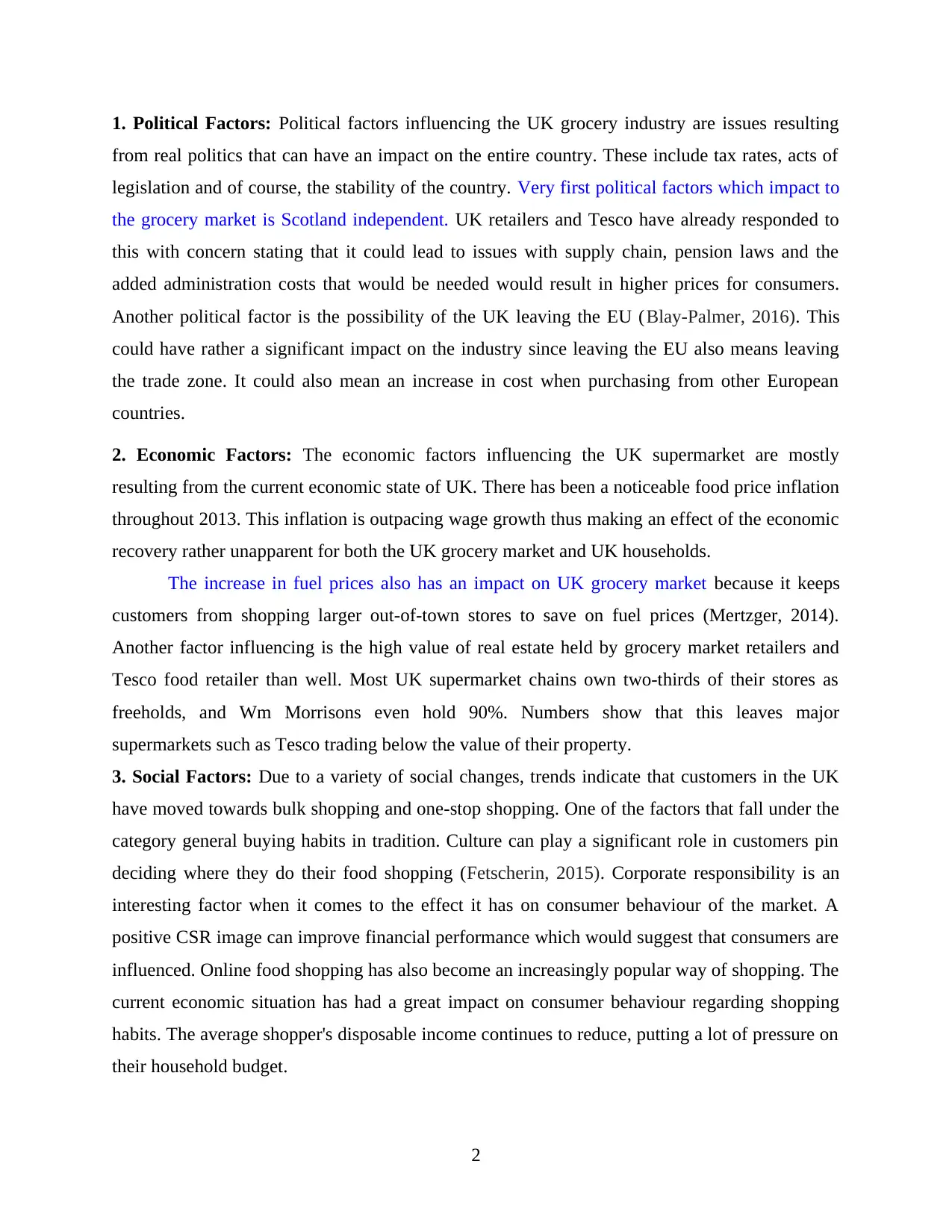
1. Political Factors: Political factors influencing the UK grocery industry are issues resulting
from real politics that can have an impact on the entire country. These include tax rates, acts of
legislation and of course, the stability of the country. Very first political factors which impact to
the grocery market is Scotland independent. UK retailers and Tesco have already responded to
this with concern stating that it could lead to issues with supply chain, pension laws and the
added administration costs that would be needed would result in higher prices for consumers.
Another political factor is the possibility of the UK leaving the EU (Blay-Palmer, 2016). This
could have rather a significant impact on the industry since leaving the EU also means leaving
the trade zone. It could also mean an increase in cost when purchasing from other European
countries.
2. Economic Factors: The economic factors influencing the UK supermarket are mostly
resulting from the current economic state of UK. There has been a noticeable food price inflation
throughout 2013. This inflation is outpacing wage growth thus making an effect of the economic
recovery rather unapparent for both the UK grocery market and UK households.
The increase in fuel prices also has an impact on UK grocery market because it keeps
customers from shopping larger out-of-town stores to save on fuel prices (Mertzger, 2014).
Another factor influencing is the high value of real estate held by grocery market retailers and
Tesco food retailer than well. Most UK supermarket chains own two-thirds of their stores as
freeholds, and Wm Morrisons even hold 90%. Numbers show that this leaves major
supermarkets such as Tesco trading below the value of their property.
3. Social Factors: Due to a variety of social changes, trends indicate that customers in the UK
have moved towards bulk shopping and one-stop shopping. One of the factors that fall under the
category general buying habits in tradition. Culture can play a significant role in customers pin
deciding where they do their food shopping (Fetscherin, 2015). Corporate responsibility is an
interesting factor when it comes to the effect it has on consumer behaviour of the market. A
positive CSR image can improve financial performance which would suggest that consumers are
influenced. Online food shopping has also become an increasingly popular way of shopping. The
current economic situation has had a great impact on consumer behaviour regarding shopping
habits. The average shopper's disposable income continues to reduce, putting a lot of pressure on
their household budget.
2
from real politics that can have an impact on the entire country. These include tax rates, acts of
legislation and of course, the stability of the country. Very first political factors which impact to
the grocery market is Scotland independent. UK retailers and Tesco have already responded to
this with concern stating that it could lead to issues with supply chain, pension laws and the
added administration costs that would be needed would result in higher prices for consumers.
Another political factor is the possibility of the UK leaving the EU (Blay-Palmer, 2016). This
could have rather a significant impact on the industry since leaving the EU also means leaving
the trade zone. It could also mean an increase in cost when purchasing from other European
countries.
2. Economic Factors: The economic factors influencing the UK supermarket are mostly
resulting from the current economic state of UK. There has been a noticeable food price inflation
throughout 2013. This inflation is outpacing wage growth thus making an effect of the economic
recovery rather unapparent for both the UK grocery market and UK households.
The increase in fuel prices also has an impact on UK grocery market because it keeps
customers from shopping larger out-of-town stores to save on fuel prices (Mertzger, 2014).
Another factor influencing is the high value of real estate held by grocery market retailers and
Tesco food retailer than well. Most UK supermarket chains own two-thirds of their stores as
freeholds, and Wm Morrisons even hold 90%. Numbers show that this leaves major
supermarkets such as Tesco trading below the value of their property.
3. Social Factors: Due to a variety of social changes, trends indicate that customers in the UK
have moved towards bulk shopping and one-stop shopping. One of the factors that fall under the
category general buying habits in tradition. Culture can play a significant role in customers pin
deciding where they do their food shopping (Fetscherin, 2015). Corporate responsibility is an
interesting factor when it comes to the effect it has on consumer behaviour of the market. A
positive CSR image can improve financial performance which would suggest that consumers are
influenced. Online food shopping has also become an increasingly popular way of shopping. The
current economic situation has had a great impact on consumer behaviour regarding shopping
habits. The average shopper's disposable income continues to reduce, putting a lot of pressure on
their household budget.
2
Paraphrase This Document
Need a fresh take? Get an instant paraphrase of this document with our AI Paraphraser
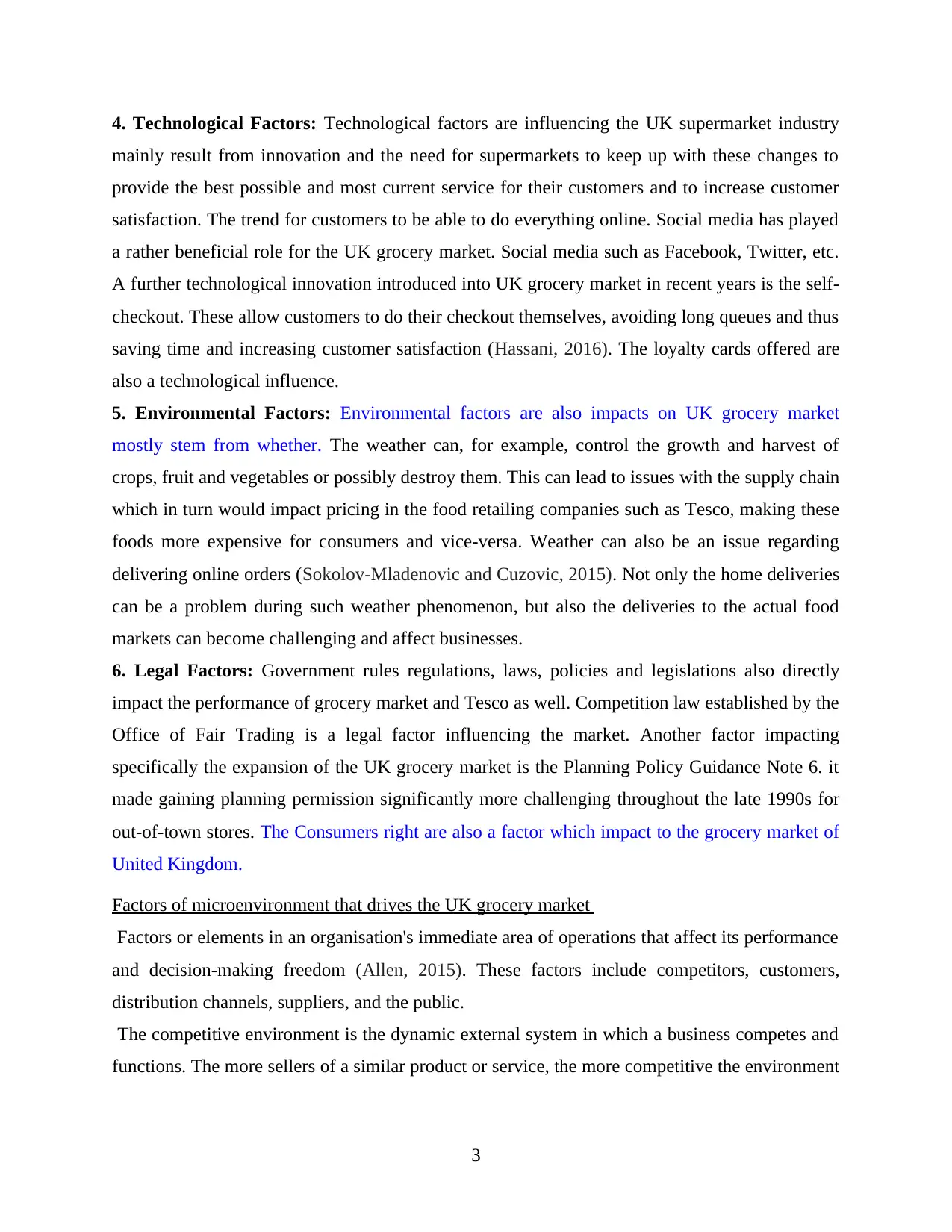
4. Technological Factors: Technological factors are influencing the UK supermarket industry
mainly result from innovation and the need for supermarkets to keep up with these changes to
provide the best possible and most current service for their customers and to increase customer
satisfaction. The trend for customers to be able to do everything online. Social media has played
a rather beneficial role for the UK grocery market. Social media such as Facebook, Twitter, etc.
A further technological innovation introduced into UK grocery market in recent years is the self-
checkout. These allow customers to do their checkout themselves, avoiding long queues and thus
saving time and increasing customer satisfaction (Hassani, 2016). The loyalty cards offered are
also a technological influence.
5. Environmental Factors: Environmental factors are also impacts on UK grocery market
mostly stem from whether. The weather can, for example, control the growth and harvest of
crops, fruit and vegetables or possibly destroy them. This can lead to issues with the supply chain
which in turn would impact pricing in the food retailing companies such as Tesco, making these
foods more expensive for consumers and vice-versa. Weather can also be an issue regarding
delivering online orders (Sokolov-Mladenovic and Cuzovic, 2015). Not only the home deliveries
can be a problem during such weather phenomenon, but also the deliveries to the actual food
markets can become challenging and affect businesses.
6. Legal Factors: Government rules regulations, laws, policies and legislations also directly
impact the performance of grocery market and Tesco as well. Competition law established by the
Office of Fair Trading is a legal factor influencing the market. Another factor impacting
specifically the expansion of the UK grocery market is the Planning Policy Guidance Note 6. it
made gaining planning permission significantly more challenging throughout the late 1990s for
out-of-town stores. The Consumers right are also a factor which impact to the grocery market of
United Kingdom.
Factors of microenvironment that drives the UK grocery market
Factors or elements in an organisation's immediate area of operations that affect its performance
and decision-making freedom (Allen, 2015). These factors include competitors, customers,
distribution channels, suppliers, and the public.
The competitive environment is the dynamic external system in which a business competes and
functions. The more sellers of a similar product or service, the more competitive the environment
3
mainly result from innovation and the need for supermarkets to keep up with these changes to
provide the best possible and most current service for their customers and to increase customer
satisfaction. The trend for customers to be able to do everything online. Social media has played
a rather beneficial role for the UK grocery market. Social media such as Facebook, Twitter, etc.
A further technological innovation introduced into UK grocery market in recent years is the self-
checkout. These allow customers to do their checkout themselves, avoiding long queues and thus
saving time and increasing customer satisfaction (Hassani, 2016). The loyalty cards offered are
also a technological influence.
5. Environmental Factors: Environmental factors are also impacts on UK grocery market
mostly stem from whether. The weather can, for example, control the growth and harvest of
crops, fruit and vegetables or possibly destroy them. This can lead to issues with the supply chain
which in turn would impact pricing in the food retailing companies such as Tesco, making these
foods more expensive for consumers and vice-versa. Weather can also be an issue regarding
delivering online orders (Sokolov-Mladenovic and Cuzovic, 2015). Not only the home deliveries
can be a problem during such weather phenomenon, but also the deliveries to the actual food
markets can become challenging and affect businesses.
6. Legal Factors: Government rules regulations, laws, policies and legislations also directly
impact the performance of grocery market and Tesco as well. Competition law established by the
Office of Fair Trading is a legal factor influencing the market. Another factor impacting
specifically the expansion of the UK grocery market is the Planning Policy Guidance Note 6. it
made gaining planning permission significantly more challenging throughout the late 1990s for
out-of-town stores. The Consumers right are also a factor which impact to the grocery market of
United Kingdom.
Factors of microenvironment that drives the UK grocery market
Factors or elements in an organisation's immediate area of operations that affect its performance
and decision-making freedom (Allen, 2015). These factors include competitors, customers,
distribution channels, suppliers, and the public.
The competitive environment is the dynamic external system in which a business competes and
functions. The more sellers of a similar product or service, the more competitive the environment
3
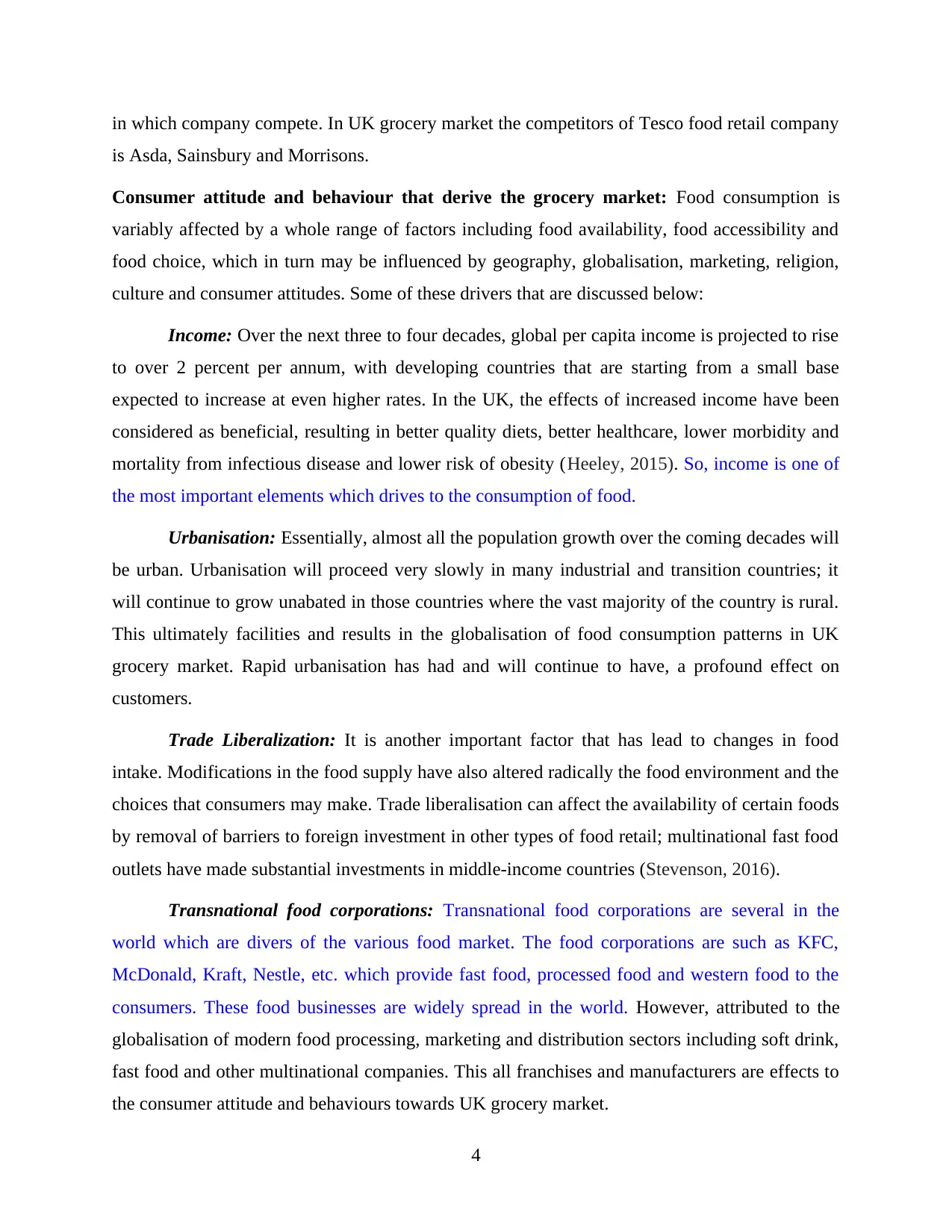
in which company compete. In UK grocery market the competitors of Tesco food retail company
is Asda, Sainsbury and Morrisons.
Consumer attitude and behaviour that derive the grocery market: Food consumption is
variably affected by a whole range of factors including food availability, food accessibility and
food choice, which in turn may be influenced by geography, globalisation, marketing, religion,
culture and consumer attitudes. Some of these drivers that are discussed below:
Income: Over the next three to four decades, global per capita income is projected to rise
to over 2 percent per annum, with developing countries that are starting from a small base
expected to increase at even higher rates. In the UK, the effects of increased income have been
considered as beneficial, resulting in better quality diets, better healthcare, lower morbidity and
mortality from infectious disease and lower risk of obesity (Heeley, 2015). So, income is one of
the most important elements which drives to the consumption of food.
Urbanisation: Essentially, almost all the population growth over the coming decades will
be urban. Urbanisation will proceed very slowly in many industrial and transition countries; it
will continue to grow unabated in those countries where the vast majority of the country is rural.
This ultimately facilities and results in the globalisation of food consumption patterns in UK
grocery market. Rapid urbanisation has had and will continue to have, a profound effect on
customers.
Trade Liberalization: It is another important factor that has lead to changes in food
intake. Modifications in the food supply have also altered radically the food environment and the
choices that consumers may make. Trade liberalisation can affect the availability of certain foods
by removal of barriers to foreign investment in other types of food retail; multinational fast food
outlets have made substantial investments in middle-income countries (Stevenson, 2016).
Transnational food corporations: Transnational food corporations are several in the
world which are divers of the various food market. The food corporations are such as KFC,
McDonald, Kraft, Nestle, etc. which provide fast food, processed food and western food to the
consumers. These food businesses are widely spread in the world. However, attributed to the
globalisation of modern food processing, marketing and distribution sectors including soft drink,
fast food and other multinational companies. This all franchises and manufacturers are effects to
the consumer attitude and behaviours towards UK grocery market.
4
is Asda, Sainsbury and Morrisons.
Consumer attitude and behaviour that derive the grocery market: Food consumption is
variably affected by a whole range of factors including food availability, food accessibility and
food choice, which in turn may be influenced by geography, globalisation, marketing, religion,
culture and consumer attitudes. Some of these drivers that are discussed below:
Income: Over the next three to four decades, global per capita income is projected to rise
to over 2 percent per annum, with developing countries that are starting from a small base
expected to increase at even higher rates. In the UK, the effects of increased income have been
considered as beneficial, resulting in better quality diets, better healthcare, lower morbidity and
mortality from infectious disease and lower risk of obesity (Heeley, 2015). So, income is one of
the most important elements which drives to the consumption of food.
Urbanisation: Essentially, almost all the population growth over the coming decades will
be urban. Urbanisation will proceed very slowly in many industrial and transition countries; it
will continue to grow unabated in those countries where the vast majority of the country is rural.
This ultimately facilities and results in the globalisation of food consumption patterns in UK
grocery market. Rapid urbanisation has had and will continue to have, a profound effect on
customers.
Trade Liberalization: It is another important factor that has lead to changes in food
intake. Modifications in the food supply have also altered radically the food environment and the
choices that consumers may make. Trade liberalisation can affect the availability of certain foods
by removal of barriers to foreign investment in other types of food retail; multinational fast food
outlets have made substantial investments in middle-income countries (Stevenson, 2016).
Transnational food corporations: Transnational food corporations are several in the
world which are divers of the various food market. The food corporations are such as KFC,
McDonald, Kraft, Nestle, etc. which provide fast food, processed food and western food to the
consumers. These food businesses are widely spread in the world. However, attributed to the
globalisation of modern food processing, marketing and distribution sectors including soft drink,
fast food and other multinational companies. This all franchises and manufacturers are effects to
the consumer attitude and behaviours towards UK grocery market.
4
⊘ This is a preview!⊘
Do you want full access?
Subscribe today to unlock all pages.

Trusted by 1+ million students worldwide
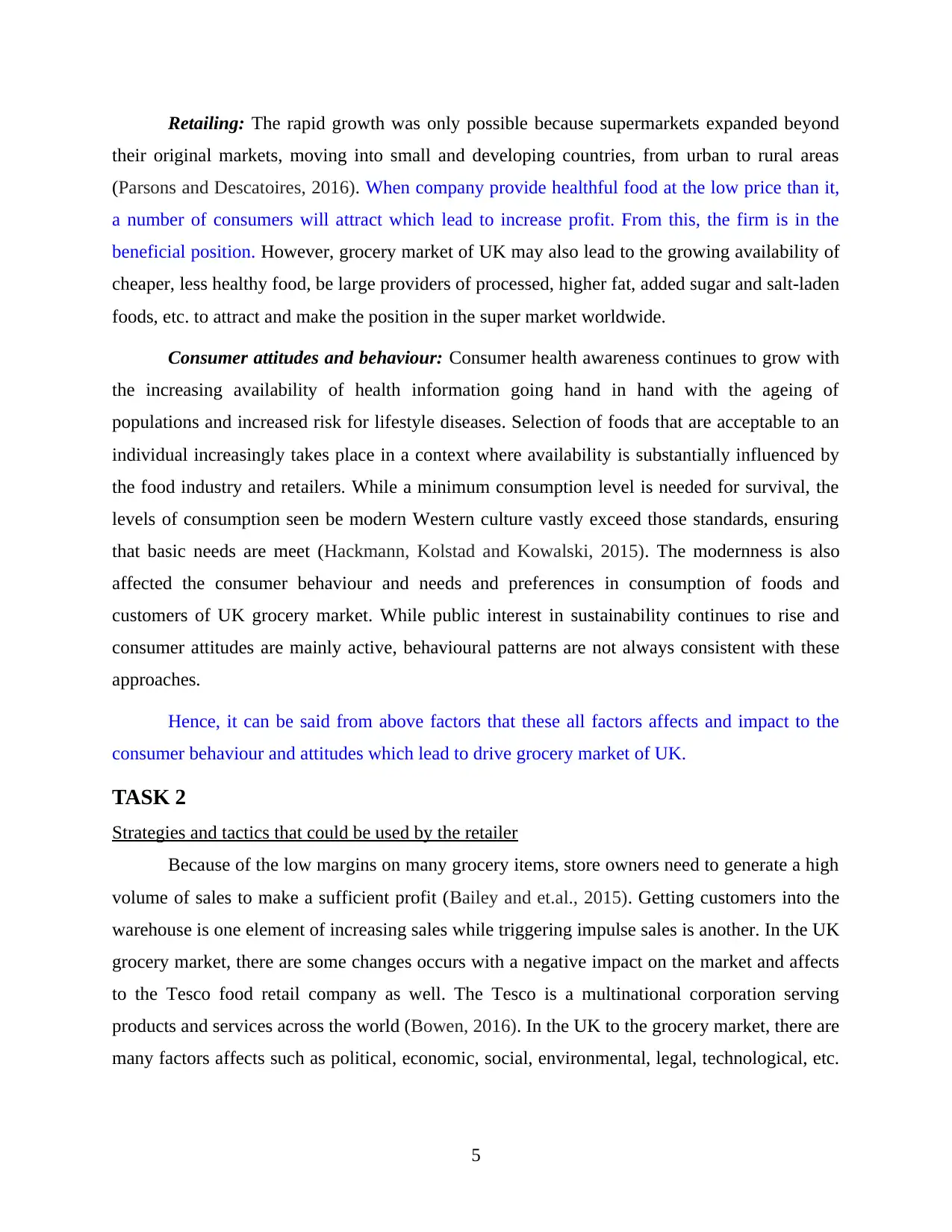
Retailing: The rapid growth was only possible because supermarkets expanded beyond
their original markets, moving into small and developing countries, from urban to rural areas
(Parsons and Descatoires, 2016). When company provide healthful food at the low price than it,
a number of consumers will attract which lead to increase profit. From this, the firm is in the
beneficial position. However, grocery market of UK may also lead to the growing availability of
cheaper, less healthy food, be large providers of processed, higher fat, added sugar and salt-laden
foods, etc. to attract and make the position in the super market worldwide.
Consumer attitudes and behaviour: Consumer health awareness continues to grow with
the increasing availability of health information going hand in hand with the ageing of
populations and increased risk for lifestyle diseases. Selection of foods that are acceptable to an
individual increasingly takes place in a context where availability is substantially influenced by
the food industry and retailers. While a minimum consumption level is needed for survival, the
levels of consumption seen be modern Western culture vastly exceed those standards, ensuring
that basic needs are meet (Hackmann, Kolstad and Kowalski, 2015). The modernness is also
affected the consumer behaviour and needs and preferences in consumption of foods and
customers of UK grocery market. While public interest in sustainability continues to rise and
consumer attitudes are mainly active, behavioural patterns are not always consistent with these
approaches.
Hence, it can be said from above factors that these all factors affects and impact to the
consumer behaviour and attitudes which lead to drive grocery market of UK.
TASK 2
Strategies and tactics that could be used by the retailer
Because of the low margins on many grocery items, store owners need to generate a high
volume of sales to make a sufficient profit (Bailey and et.al., 2015). Getting customers into the
warehouse is one element of increasing sales while triggering impulse sales is another. In the UK
grocery market, there are some changes occurs with a negative impact on the market and affects
to the Tesco food retail company as well. The Tesco is a multinational corporation serving
products and services across the world (Bowen, 2016). In the UK to the grocery market, there are
many factors affects such as political, economic, social, environmental, legal, technological, etc.
5
their original markets, moving into small and developing countries, from urban to rural areas
(Parsons and Descatoires, 2016). When company provide healthful food at the low price than it,
a number of consumers will attract which lead to increase profit. From this, the firm is in the
beneficial position. However, grocery market of UK may also lead to the growing availability of
cheaper, less healthy food, be large providers of processed, higher fat, added sugar and salt-laden
foods, etc. to attract and make the position in the super market worldwide.
Consumer attitudes and behaviour: Consumer health awareness continues to grow with
the increasing availability of health information going hand in hand with the ageing of
populations and increased risk for lifestyle diseases. Selection of foods that are acceptable to an
individual increasingly takes place in a context where availability is substantially influenced by
the food industry and retailers. While a minimum consumption level is needed for survival, the
levels of consumption seen be modern Western culture vastly exceed those standards, ensuring
that basic needs are meet (Hackmann, Kolstad and Kowalski, 2015). The modernness is also
affected the consumer behaviour and needs and preferences in consumption of foods and
customers of UK grocery market. While public interest in sustainability continues to rise and
consumer attitudes are mainly active, behavioural patterns are not always consistent with these
approaches.
Hence, it can be said from above factors that these all factors affects and impact to the
consumer behaviour and attitudes which lead to drive grocery market of UK.
TASK 2
Strategies and tactics that could be used by the retailer
Because of the low margins on many grocery items, store owners need to generate a high
volume of sales to make a sufficient profit (Bailey and et.al., 2015). Getting customers into the
warehouse is one element of increasing sales while triggering impulse sales is another. In the UK
grocery market, there are some changes occurs with a negative impact on the market and affects
to the Tesco food retail company as well. The Tesco is a multinational corporation serving
products and services across the world (Bowen, 2016). In the UK to the grocery market, there are
many factors affects such as political, economic, social, environmental, legal, technological, etc.
5
Paraphrase This Document
Need a fresh take? Get an instant paraphrase of this document with our AI Paraphraser
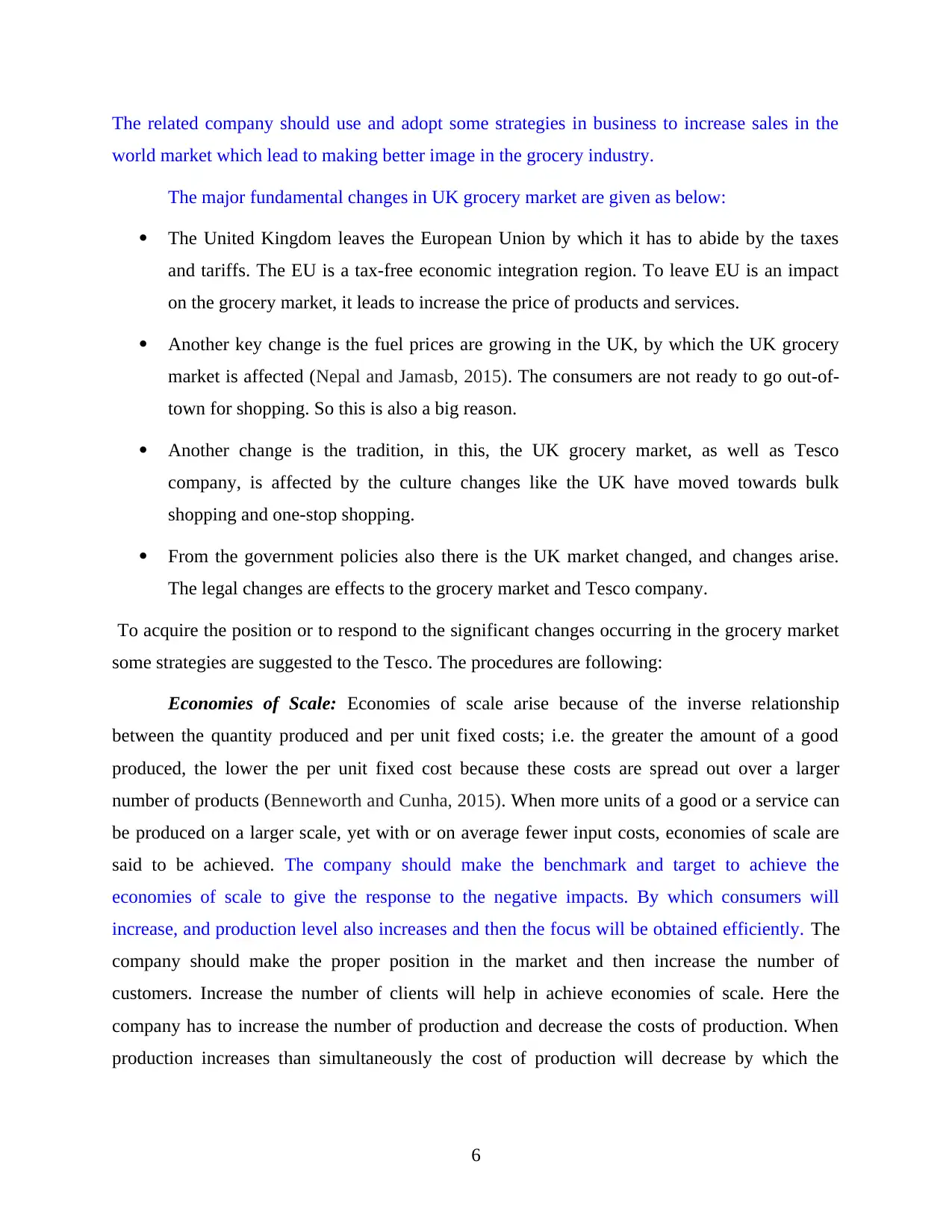
The related company should use and adopt some strategies in business to increase sales in the
world market which lead to making better image in the grocery industry.
The major fundamental changes in UK grocery market are given as below:
The United Kingdom leaves the European Union by which it has to abide by the taxes
and tariffs. The EU is a tax-free economic integration region. To leave EU is an impact
on the grocery market, it leads to increase the price of products and services.
Another key change is the fuel prices are growing in the UK, by which the UK grocery
market is affected (Nepal and Jamasb, 2015). The consumers are not ready to go out-of-
town for shopping. So this is also a big reason.
Another change is the tradition, in this, the UK grocery market, as well as Tesco
company, is affected by the culture changes like the UK have moved towards bulk
shopping and one-stop shopping.
From the government policies also there is the UK market changed, and changes arise.
The legal changes are effects to the grocery market and Tesco company.
To acquire the position or to respond to the significant changes occurring in the grocery market
some strategies are suggested to the Tesco. The procedures are following:
Economies of Scale: Economies of scale arise because of the inverse relationship
between the quantity produced and per unit fixed costs; i.e. the greater the amount of a good
produced, the lower the per unit fixed cost because these costs are spread out over a larger
number of products (Benneworth and Cunha, 2015). When more units of a good or a service can
be produced on a larger scale, yet with or on average fewer input costs, economies of scale are
said to be achieved. The company should make the benchmark and target to achieve the
economies of scale to give the response to the negative impacts. By which consumers will
increase, and production level also increases and then the focus will be obtained efficiently. The
company should make the proper position in the market and then increase the number of
customers. Increase the number of clients will help in achieve economies of scale. Here the
company has to increase the number of production and decrease the costs of production. When
production increases than simultaneously the cost of production will decrease by which the
6
world market which lead to making better image in the grocery industry.
The major fundamental changes in UK grocery market are given as below:
The United Kingdom leaves the European Union by which it has to abide by the taxes
and tariffs. The EU is a tax-free economic integration region. To leave EU is an impact
on the grocery market, it leads to increase the price of products and services.
Another key change is the fuel prices are growing in the UK, by which the UK grocery
market is affected (Nepal and Jamasb, 2015). The consumers are not ready to go out-of-
town for shopping. So this is also a big reason.
Another change is the tradition, in this, the UK grocery market, as well as Tesco
company, is affected by the culture changes like the UK have moved towards bulk
shopping and one-stop shopping.
From the government policies also there is the UK market changed, and changes arise.
The legal changes are effects to the grocery market and Tesco company.
To acquire the position or to respond to the significant changes occurring in the grocery market
some strategies are suggested to the Tesco. The procedures are following:
Economies of Scale: Economies of scale arise because of the inverse relationship
between the quantity produced and per unit fixed costs; i.e. the greater the amount of a good
produced, the lower the per unit fixed cost because these costs are spread out over a larger
number of products (Benneworth and Cunha, 2015). When more units of a good or a service can
be produced on a larger scale, yet with or on average fewer input costs, economies of scale are
said to be achieved. The company should make the benchmark and target to achieve the
economies of scale to give the response to the negative impacts. By which consumers will
increase, and production level also increases and then the focus will be obtained efficiently. The
company should make the proper position in the market and then increase the number of
customers. Increase the number of clients will help in achieve economies of scale. Here the
company has to increase the number of production and decrease the costs of production. When
production increases than simultaneously the cost of production will decrease by which the
6
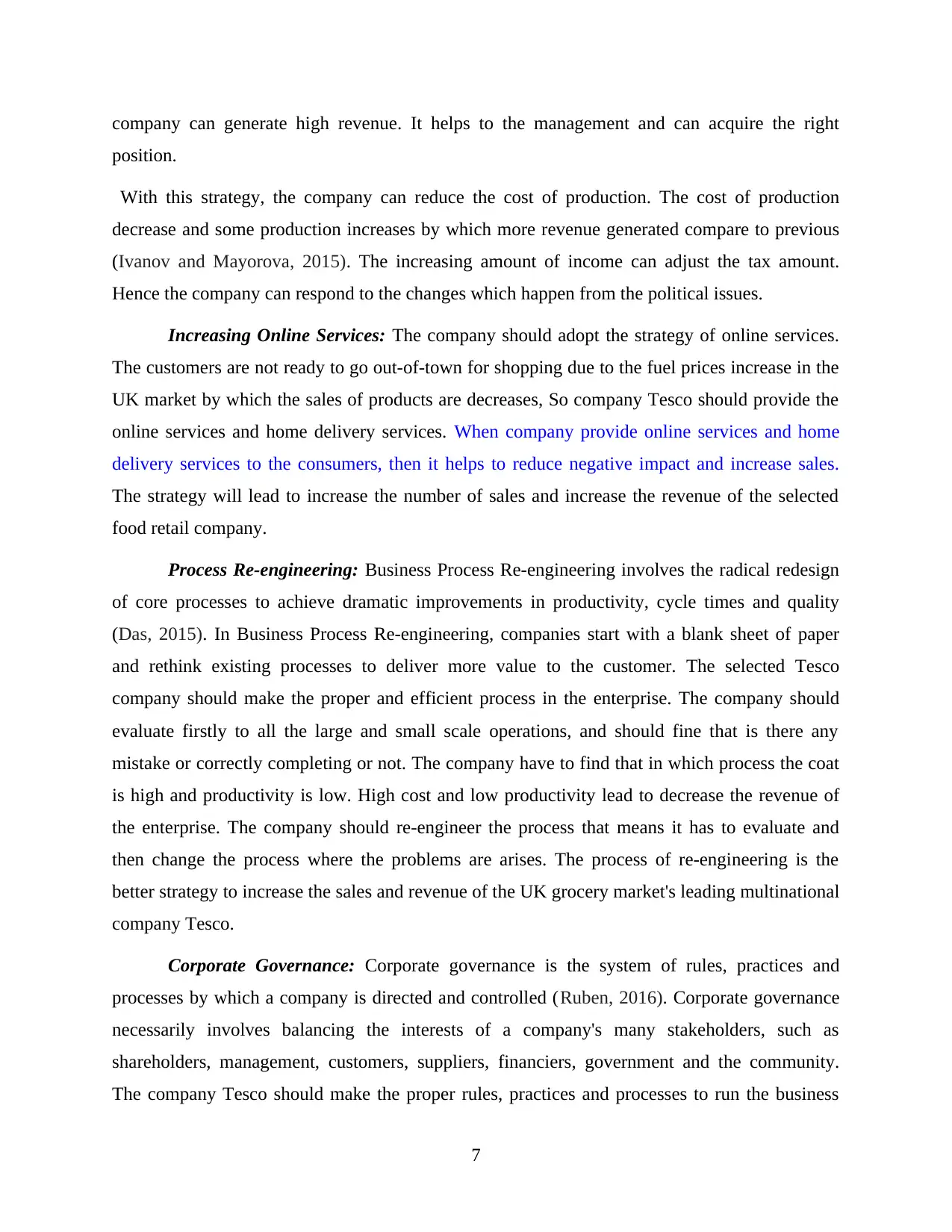
company can generate high revenue. It helps to the management and can acquire the right
position.
With this strategy, the company can reduce the cost of production. The cost of production
decrease and some production increases by which more revenue generated compare to previous
(Ivanov and Mayorova, 2015). The increasing amount of income can adjust the tax amount.
Hence the company can respond to the changes which happen from the political issues.
Increasing Online Services: The company should adopt the strategy of online services.
The customers are not ready to go out-of-town for shopping due to the fuel prices increase in the
UK market by which the sales of products are decreases, So company Tesco should provide the
online services and home delivery services. When company provide online services and home
delivery services to the consumers, then it helps to reduce negative impact and increase sales.
The strategy will lead to increase the number of sales and increase the revenue of the selected
food retail company.
Process Re-engineering: Business Process Re-engineering involves the radical redesign
of core processes to achieve dramatic improvements in productivity, cycle times and quality
(Das, 2015). In Business Process Re-engineering, companies start with a blank sheet of paper
and rethink existing processes to deliver more value to the customer. The selected Tesco
company should make the proper and efficient process in the enterprise. The company should
evaluate firstly to all the large and small scale operations, and should fine that is there any
mistake or correctly completing or not. The company have to find that in which process the coat
is high and productivity is low. High cost and low productivity lead to decrease the revenue of
the enterprise. The company should re-engineer the process that means it has to evaluate and
then change the process where the problems are arises. The process of re-engineering is the
better strategy to increase the sales and revenue of the UK grocery market's leading multinational
company Tesco.
Corporate Governance: Corporate governance is the system of rules, practices and
processes by which a company is directed and controlled (Ruben, 2016). Corporate governance
necessarily involves balancing the interests of a company's many stakeholders, such as
shareholders, management, customers, suppliers, financiers, government and the community.
The company Tesco should make the proper rules, practices and processes to run the business
7
position.
With this strategy, the company can reduce the cost of production. The cost of production
decrease and some production increases by which more revenue generated compare to previous
(Ivanov and Mayorova, 2015). The increasing amount of income can adjust the tax amount.
Hence the company can respond to the changes which happen from the political issues.
Increasing Online Services: The company should adopt the strategy of online services.
The customers are not ready to go out-of-town for shopping due to the fuel prices increase in the
UK market by which the sales of products are decreases, So company Tesco should provide the
online services and home delivery services. When company provide online services and home
delivery services to the consumers, then it helps to reduce negative impact and increase sales.
The strategy will lead to increase the number of sales and increase the revenue of the selected
food retail company.
Process Re-engineering: Business Process Re-engineering involves the radical redesign
of core processes to achieve dramatic improvements in productivity, cycle times and quality
(Das, 2015). In Business Process Re-engineering, companies start with a blank sheet of paper
and rethink existing processes to deliver more value to the customer. The selected Tesco
company should make the proper and efficient process in the enterprise. The company should
evaluate firstly to all the large and small scale operations, and should fine that is there any
mistake or correctly completing or not. The company have to find that in which process the coat
is high and productivity is low. High cost and low productivity lead to decrease the revenue of
the enterprise. The company should re-engineer the process that means it has to evaluate and
then change the process where the problems are arises. The process of re-engineering is the
better strategy to increase the sales and revenue of the UK grocery market's leading multinational
company Tesco.
Corporate Governance: Corporate governance is the system of rules, practices and
processes by which a company is directed and controlled (Ruben, 2016). Corporate governance
necessarily involves balancing the interests of a company's many stakeholders, such as
shareholders, management, customers, suppliers, financiers, government and the community.
The company Tesco should make the proper rules, practices and processes to run the business
7
⊘ This is a preview!⊘
Do you want full access?
Subscribe today to unlock all pages.

Trusted by 1+ million students worldwide
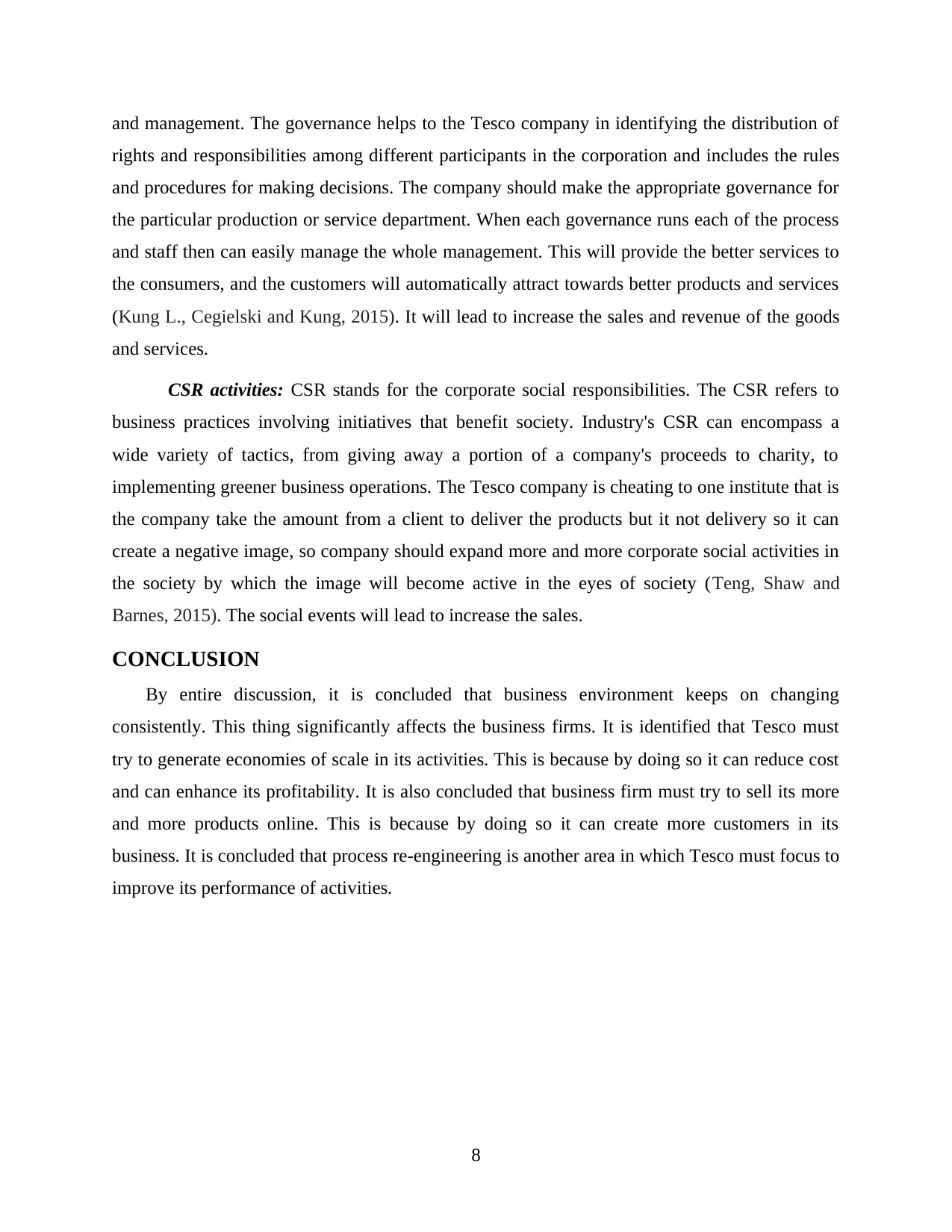
and management. The governance helps to the Tesco company in identifying the distribution of
rights and responsibilities among different participants in the corporation and includes the rules
and procedures for making decisions. The company should make the appropriate governance for
the particular production or service department. When each governance runs each of the process
and staff then can easily manage the whole management. This will provide the better services to
the consumers, and the customers will automatically attract towards better products and services
(Kung L., Cegielski and Kung, 2015). It will lead to increase the sales and revenue of the goods
and services.
CSR activities: CSR stands for the corporate social responsibilities. The CSR refers to
business practices involving initiatives that benefit society. Industry's CSR can encompass a
wide variety of tactics, from giving away a portion of a company's proceeds to charity, to
implementing greener business operations. The Tesco company is cheating to one institute that is
the company take the amount from a client to deliver the products but it not delivery so it can
create a negative image, so company should expand more and more corporate social activities in
the society by which the image will become active in the eyes of society (Teng, Shaw and
Barnes, 2015). The social events will lead to increase the sales.
CONCLUSION
By entire discussion, it is concluded that business environment keeps on changing
consistently. This thing significantly affects the business firms. It is identified that Tesco must
try to generate economies of scale in its activities. This is because by doing so it can reduce cost
and can enhance its profitability. It is also concluded that business firm must try to sell its more
and more products online. This is because by doing so it can create more customers in its
business. It is concluded that process re-engineering is another area in which Tesco must focus to
improve its performance of activities.
8
rights and responsibilities among different participants in the corporation and includes the rules
and procedures for making decisions. The company should make the appropriate governance for
the particular production or service department. When each governance runs each of the process
and staff then can easily manage the whole management. This will provide the better services to
the consumers, and the customers will automatically attract towards better products and services
(Kung L., Cegielski and Kung, 2015). It will lead to increase the sales and revenue of the goods
and services.
CSR activities: CSR stands for the corporate social responsibilities. The CSR refers to
business practices involving initiatives that benefit society. Industry's CSR can encompass a
wide variety of tactics, from giving away a portion of a company's proceeds to charity, to
implementing greener business operations. The Tesco company is cheating to one institute that is
the company take the amount from a client to deliver the products but it not delivery so it can
create a negative image, so company should expand more and more corporate social activities in
the society by which the image will become active in the eyes of society (Teng, Shaw and
Barnes, 2015). The social events will lead to increase the sales.
CONCLUSION
By entire discussion, it is concluded that business environment keeps on changing
consistently. This thing significantly affects the business firms. It is identified that Tesco must
try to generate economies of scale in its activities. This is because by doing so it can reduce cost
and can enhance its profitability. It is also concluded that business firm must try to sell its more
and more products online. This is because by doing so it can create more customers in its
business. It is concluded that process re-engineering is another area in which Tesco must focus to
improve its performance of activities.
8
Paraphrase This Document
Need a fresh take? Get an instant paraphrase of this document with our AI Paraphraser
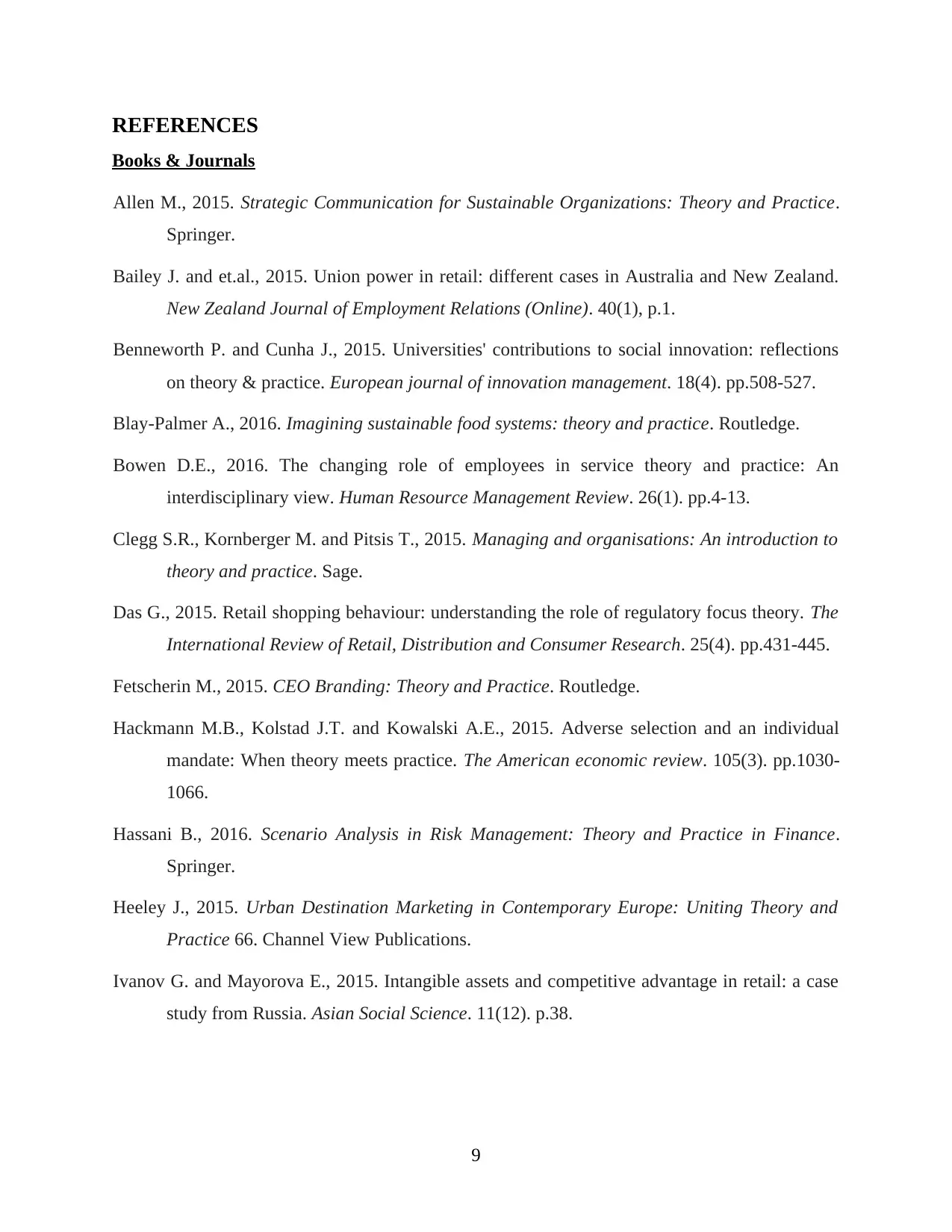
REFERENCES
Books & Journals
Allen M., 2015. Strategic Communication for Sustainable Organizations: Theory and Practice.
Springer.
Bailey J. and et.al., 2015. Union power in retail: different cases in Australia and New Zealand.
New Zealand Journal of Employment Relations (Online). 40(1), p.1.
Benneworth P. and Cunha J., 2015. Universities' contributions to social innovation: reflections
on theory & practice. European journal of innovation management. 18(4). pp.508-527.
Blay-Palmer A., 2016. Imagining sustainable food systems: theory and practice. Routledge.
Bowen D.E., 2016. The changing role of employees in service theory and practice: An
interdisciplinary view. Human Resource Management Review. 26(1). pp.4-13.
Clegg S.R., Kornberger M. and Pitsis T., 2015. Managing and organisations: An introduction to
theory and practice. Sage.
Das G., 2015. Retail shopping behaviour: understanding the role of regulatory focus theory. The
International Review of Retail, Distribution and Consumer Research. 25(4). pp.431-445.
Fetscherin M., 2015. CEO Branding: Theory and Practice. Routledge.
Hackmann M.B., Kolstad J.T. and Kowalski A.E., 2015. Adverse selection and an individual
mandate: When theory meets practice. The American economic review. 105(3). pp.1030-
1066.
Hassani B., 2016. Scenario Analysis in Risk Management: Theory and Practice in Finance.
Springer.
Heeley J., 2015. Urban Destination Marketing in Contemporary Europe: Uniting Theory and
Practice 66. Channel View Publications.
Ivanov G. and Mayorova E., 2015. Intangible assets and competitive advantage in retail: a case
study from Russia. Asian Social Science. 11(12). p.38.
9
Books & Journals
Allen M., 2015. Strategic Communication for Sustainable Organizations: Theory and Practice.
Springer.
Bailey J. and et.al., 2015. Union power in retail: different cases in Australia and New Zealand.
New Zealand Journal of Employment Relations (Online). 40(1), p.1.
Benneworth P. and Cunha J., 2015. Universities' contributions to social innovation: reflections
on theory & practice. European journal of innovation management. 18(4). pp.508-527.
Blay-Palmer A., 2016. Imagining sustainable food systems: theory and practice. Routledge.
Bowen D.E., 2016. The changing role of employees in service theory and practice: An
interdisciplinary view. Human Resource Management Review. 26(1). pp.4-13.
Clegg S.R., Kornberger M. and Pitsis T., 2015. Managing and organisations: An introduction to
theory and practice. Sage.
Das G., 2015. Retail shopping behaviour: understanding the role of regulatory focus theory. The
International Review of Retail, Distribution and Consumer Research. 25(4). pp.431-445.
Fetscherin M., 2015. CEO Branding: Theory and Practice. Routledge.
Hackmann M.B., Kolstad J.T. and Kowalski A.E., 2015. Adverse selection and an individual
mandate: When theory meets practice. The American economic review. 105(3). pp.1030-
1066.
Hassani B., 2016. Scenario Analysis in Risk Management: Theory and Practice in Finance.
Springer.
Heeley J., 2015. Urban Destination Marketing in Contemporary Europe: Uniting Theory and
Practice 66. Channel View Publications.
Ivanov G. and Mayorova E., 2015. Intangible assets and competitive advantage in retail: a case
study from Russia. Asian Social Science. 11(12). p.38.
9
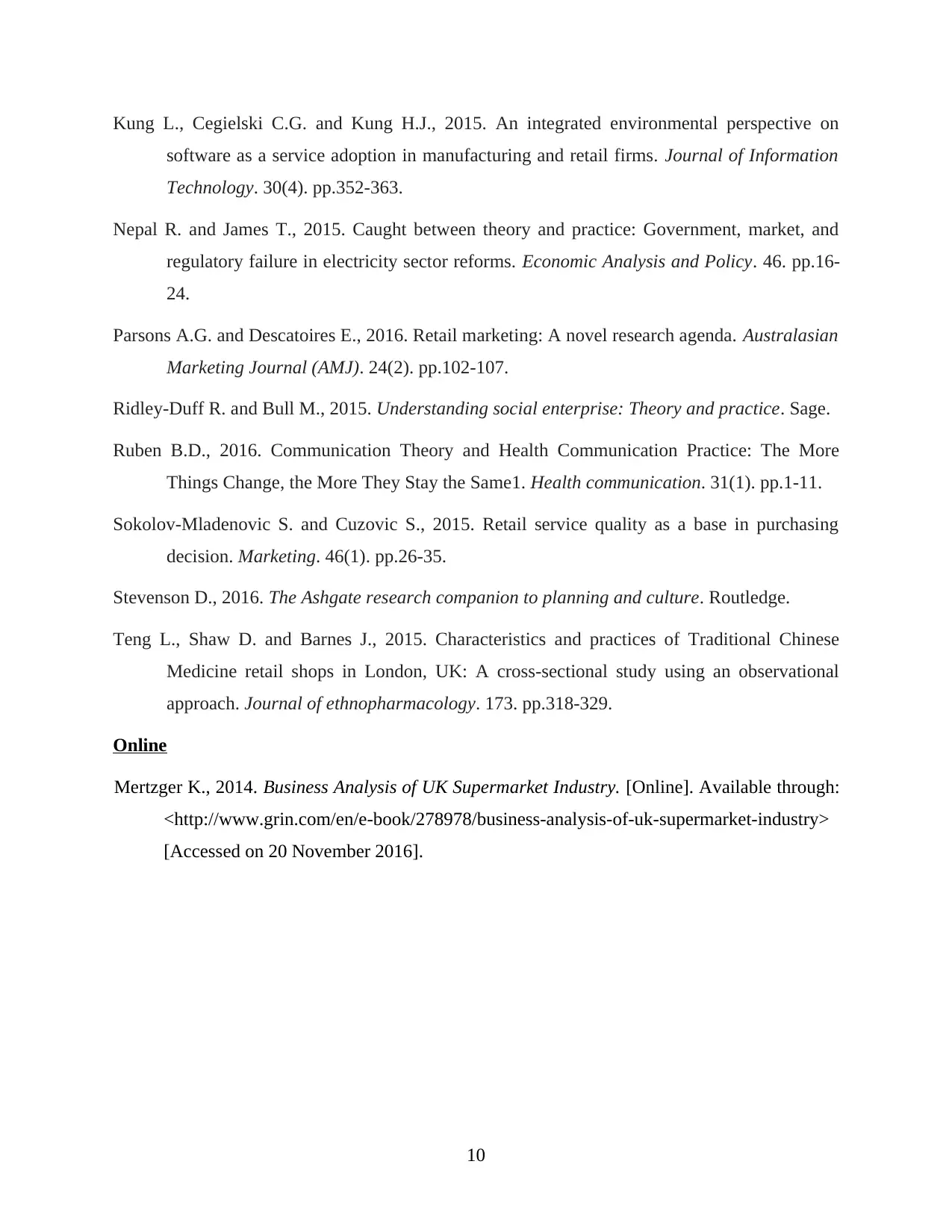
Kung L., Cegielski C.G. and Kung H.J., 2015. An integrated environmental perspective on
software as a service adoption in manufacturing and retail firms. Journal of Information
Technology. 30(4). pp.352-363.
Nepal R. and James T., 2015. Caught between theory and practice: Government, market, and
regulatory failure in electricity sector reforms. Economic Analysis and Policy. 46. pp.16-
24.
Parsons A.G. and Descatoires E., 2016. Retail marketing: A novel research agenda. Australasian
Marketing Journal (AMJ). 24(2). pp.102-107.
Ridley-Duff R. and Bull M., 2015. Understanding social enterprise: Theory and practice. Sage.
Ruben B.D., 2016. Communication Theory and Health Communication Practice: The More
Things Change, the More They Stay the Same1. Health communication. 31(1). pp.1-11.
Sokolov-Mladenovic S. and Cuzovic S., 2015. Retail service quality as a base in purchasing
decision. Marketing. 46(1). pp.26-35.
Stevenson D., 2016. The Ashgate research companion to planning and culture. Routledge.
Teng L., Shaw D. and Barnes J., 2015. Characteristics and practices of Traditional Chinese
Medicine retail shops in London, UK: A cross-sectional study using an observational
approach. Journal of ethnopharmacology. 173. pp.318-329.
Online
Mertzger K., 2014. Business Analysis of UK Supermarket Industry. [Online]. Available through:
<http://www.grin.com/en/e-book/278978/business-analysis-of-uk-supermarket-industry>
[Accessed on 20 November 2016].
10
software as a service adoption in manufacturing and retail firms. Journal of Information
Technology. 30(4). pp.352-363.
Nepal R. and James T., 2015. Caught between theory and practice: Government, market, and
regulatory failure in electricity sector reforms. Economic Analysis and Policy. 46. pp.16-
24.
Parsons A.G. and Descatoires E., 2016. Retail marketing: A novel research agenda. Australasian
Marketing Journal (AMJ). 24(2). pp.102-107.
Ridley-Duff R. and Bull M., 2015. Understanding social enterprise: Theory and practice. Sage.
Ruben B.D., 2016. Communication Theory and Health Communication Practice: The More
Things Change, the More They Stay the Same1. Health communication. 31(1). pp.1-11.
Sokolov-Mladenovic S. and Cuzovic S., 2015. Retail service quality as a base in purchasing
decision. Marketing. 46(1). pp.26-35.
Stevenson D., 2016. The Ashgate research companion to planning and culture. Routledge.
Teng L., Shaw D. and Barnes J., 2015. Characteristics and practices of Traditional Chinese
Medicine retail shops in London, UK: A cross-sectional study using an observational
approach. Journal of ethnopharmacology. 173. pp.318-329.
Online
Mertzger K., 2014. Business Analysis of UK Supermarket Industry. [Online]. Available through:
<http://www.grin.com/en/e-book/278978/business-analysis-of-uk-supermarket-industry>
[Accessed on 20 November 2016].
10
⊘ This is a preview!⊘
Do you want full access?
Subscribe today to unlock all pages.

Trusted by 1+ million students worldwide
1 out of 12
Related Documents
Your All-in-One AI-Powered Toolkit for Academic Success.
+13062052269
info@desklib.com
Available 24*7 on WhatsApp / Email
![[object Object]](/_next/static/media/star-bottom.7253800d.svg)
Unlock your academic potential
Copyright © 2020–2026 A2Z Services. All Rights Reserved. Developed and managed by ZUCOL.





